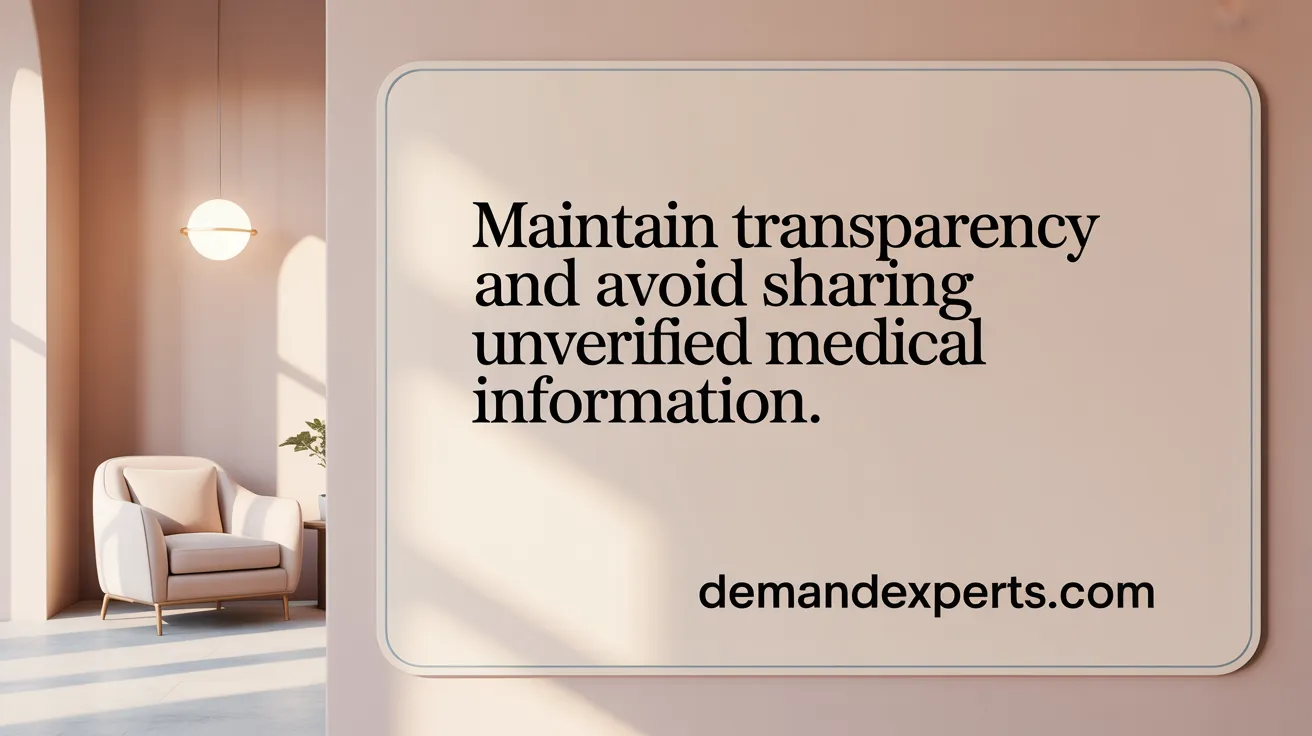Navigating the Complex Landscape of Healthcare Digital Marketing Compliance
Healthcare digital marketing offers immense opportunities to engage and inform patients, but it also carries significant regulatory responsibilities. Understanding and adhering to compliance requirements is critical to safeguarding patient privacy, maintaining trust, and avoiding costly violations. This article explores the essential dos and don'ts of healthcare digital marketing compliance, guiding providers and marketers in executing ethical, legal, and effective campaigns within today’s complex regulatory environment.
Understanding Key Regulations and Compliance Requirements in Healthcare Digital Marketing
What are the key regulations and compliance requirements for healthcare digital marketing?
Healthcare digital marketing must adhere to strict legal frameworks designed to protect patient information. In the United States, HIPAA (Health Insurance Portability and Accountability Act) is the primary regulation that governs the privacy and security of Protected Health Information (PHI). It restricts sharing patient data without explicit consent and mandates that all digital communications involving PHI be secure.
Beyond HIPAA, international standards like GDPR (General Data Protection Regulation) also influence how healthcare organizations handle data, especially when engaging globally. These laws emphasize transparency, requiring practices to clearly disclose how patient information is used, stored, and protected.
Key compliance practices include obtaining explicit written consent from patients before using their information in marketing activities. Data encryption both during transmission and at rest is essential to prevent unauthorized access. Utilizing HIPAA-compliant platforms, such as secure email services like Paubox, ensures that communications and data storage meet regulatory standards.
Healthcare providers should regularly audit their data practices, train staff on privacy protocols, and implement strict access controls. Signing Business Associate Agreements (BAAs) with any vendors, marketing agencies, or third-party service providers who handle PHI is mandatory.
A critical aspect of compliance is understanding what constitutes marketing under HIPAA. Activities like sharing patient testimonials, images, or health information without consent are prohibited. Conversely, sharing general health advice, research updates, or technological advancements, as long as they are not patient-specific, is permissible.
Looking ahead, regulations are expected to tighten around data privacy, integrating new technologies like AI and machine learning. These changes will likely demand even greater vigilance and adherence to patient rights, reinforcing the importance of transparent, secure, and compliant marketing strategies.
Best Practices for Ethical and Legal Healthcare Marketing Strategies

What are best practices for legal and ethical healthcare marketing strategies?
Healthcare marketing must adhere to strict legal and ethical standards to protect patient rights and maintain trust. One essential principle is to ensure that all claims made in marketing materials are evidence-based and supported by credible research. This transparency helps patients make informed decisions and preserves the integrity of the healthcare provider.
Respecting patient privacy is paramount. Under laws like HIPAA, any use of personal health information (PHI) for marketing requires explicit patient consent. This includes obtaining written authorization before sharing patient stories, images, or any identifiable data. Sharing detailed injury information or photos without permission can lead to violations and legal repercussions.
Marketing approaches should avoid fear-based, exaggerated, or manipulative tactics. Instead, they should focus on providing factual, balanced, and educational content that empowers patients. Avoiding the sale of patient data or offering free services in exchange for identifiable information also aligns with legal requirements and ethical standards.
Compliance with federal regulations such as those from the FDA, FTC, and anti-kickback statutes is also essential. For example, disclosures and disclaimers must be clearly included where necessary, and promotional claims should be truthful and not misleading.
Finally, building trust depends on honest, clear communication. Employing patient-centered messaging that is accessible, culturally sensitive, and free from jargon encourages engagement and demonstrates a genuine commitment to patient well-being. Combining these best practices fosters a trustworthy healthcare environment that respects legal boundaries and prioritizes patient care.
Navigating Social Media Marketing Guidelines and Restrictions for Healthcare Providers

What guidelines should healthcare providers follow for social media marketing?
Healthcare providers need to adhere to strict rules to ensure their social media marketing activities are both effective and compliant with legal standards like HIPAA. They should keep personal and professional accounts separate to prevent accidental sharing of PHI. All content must be verified for accuracy, avoiding the spread of misinformation.
Before sharing anything related to patients, providers must obtain explicit, written consent to protect patient rights and privacy. Incorporating disclaimers and developing social media policies help prevent unintentional PHI disclosure and set clear boundaries around patient interactions.
Content should focus on educational and engaging material tailored to the community’s needs. Using relevant hashtags and platform-specific features like Stories, Reels, or Messenger can maximize engagement. Monitoring metrics helps refine strategies, making outreach more effective.
Staff should undergo regular training on legal and ethical considerations, and practices should implement compliance tools and policies. Partnering with HIPAA-compliant marketing agencies and using secure platforms further supports responsible marketing efforts. This comprehensive approach ensures digital outreach builds trust while respecting patient confidentiality.
Dos and Don'ts of Healthcare Marketing Communication: Ensuring Compliance and Effectiveness

What are the dos and don'ts of healthcare marketing communication?
Effective healthcare marketing requires a careful balance between engaging content and strict adherence to legal and ethical standards. The dos of healthcare marketing include maintaining accurate, local listings across platforms like Google and Facebook to ensure potential patients find consistent, correct information about your practice. Developing a strategic content plan that emphasizes educational value helps residents understand common health issues and available services.
Leveraging multiple outreach channels—such as social media, email newsletters, websites, and mobile apps—maximizes audience engagement. Mobile optimization ensures users on smartphones or tablets have a seamless experience accessing your content.
Staying compliant with HIPAA and Federal Trade Commission (FTC) guidelines is vital. This involves obtaining explicit patient consent before sharing any protected health information (PHI) and avoiding the disclosure of identifiable patient details. Responding professionally to online reviews, whether positive or negative, helps maintain a trustworthy reputation.
On the other hand, the don’ts mainly focus on actions that could breach patient confidentiality or damage credibility. Avoid being overly sales-focused or sharing unverified medical claims. Never disclose patient details or photos without written permission, as doing so can violate HIPAA. Also, steer clear of misleading information or inconsistent messaging that can erode trust.
Another common mistake is neglecting to track the effectiveness of marketing efforts. Monitoring engagement, reach, and feedback helps refine strategies and achieve better outcomes.
Overall, transparency, professionalism, and a strong focus on patient-centered messages foster not only compliance but also a positive reputation and increased patient trust.
Implementing HIPAA Compliance and Legal Safeguards in Healthcare Digital Outreach

What legal considerations and restrictions apply to healthcare digital outreach?
Healthcare digital outreach must navigate strict legal landscapes aimed at protecting patient privacy. The Health Insurance Portability and Accountability Act (HIPAA) is the fundamental regulation that governs the use of Protected Health Information (PHI). It requires explicit patient consent before any PHI is used in marketing, mandates secure and encrypted platforms for digital communications, and necessitates signing Business Associate Agreements (BAAs) with vendors handling PHI.
Beyond HIPAA, regulations like the General Data Protection Regulation (GDPR) apply when handling data of EU citizens, emphasizing transparency, data minimization, and explicit consent. The Federal Trade Commission (FTC) and Food and Drug Administration (FDA) also set standards to ensure truthful claims, disclosures, and compliance in medical advertising. Healthcare entities should develop comprehensive policies, train staff regularly, and work closely with legal experts to ensure their digital outreach efforts adhere to these complex regulations.
How can healthcare marketers ensure HIPAA compliance while protecting patient privacy in digital marketing?
Marketers in healthcare can uphold privacy and comply with HIPAA by obtaining explicit, written consent from patients before incorporating their PHI into promotional materials. This includes not selling or distributing patient lists for third-party promotions. Using HIPAA-compliant tools like Paubox, which offers encrypted email and marketing platforms, ensures data security.
Implementing strong security measures such as encryption, access controls, and secure online forms is vital. Partnering only with vendors who have signed BAAs guarantees that all third-party handling of PHI remains compliant. It is best practice to avoid sharing identifiable patient information publicly, especially on social media platforms, and to focus marketing messages on general health topics and practice updates.
Continuous staff training on HIPAA regulations and conducting regular audits help prevent inadvertent disclosures. These efforts create a trustworthy environment where patient privacy remains priority.
How can healthcare organizations conduct responsible and compliant marketing campaigns?
Responsible marketing starts with obtaining specific, written patient approvals for any use of PHI, with clear explanations of how the data will be used and options for opt-out. Only non-sensitive metrics like website visits and engagement rates should be used for monitoring campaign success, minimizing privacy risks.
Employing HIPAA-compliant analytics tools that offer BAAs, along with implementing comprehensive data security protocols, safeguards patient information while enabling effective campaigns. Staff should be trained to distinguish between educational content and promotional efforts, ensuring all campaigns include proper disclosures and avoid sharing identifiable patient details.
Staying informed about evolving advertising laws and privacy regulations allows organizations to adapt their strategies, ensuring ongoing compliance and reputation management. Regular audits and a well-defined breach response plan further reinforce responsible marketing practices.
Ensuring Trust and Compliance in Healthcare Digital Marketing
Healthcare digital marketing demands meticulous adherence to regulatory frameworks like HIPAA, FDA, and FTC guidelines to protect patient privacy and uphold ethical standards. By following best practices—such as securing explicit patient consent, utilizing HIPAA-compliant technologies, adopting transparent and evidence-based messaging, and rigorously managing social media engagement—healthcare providers can effectively communicate while minimizing risk. Continual education, vigilant auditing, and collaboration with compliant vendors reinforce these efforts, helping healthcare organizations build lasting trust and deliver quality care information responsibly. Embracing these dos and avoiding common pitfalls is paramount for successful, compliant healthcare digital marketing campaigns.
References
- The Do's and Don't's of Marketing With HIPAA
- The Do's & Don'ts of Social Media Marketing for Healthcare
- Mastering Digital Outreach in Healthcare: Essential Dos ...
- HIPAA compliance in digital marketing
- The Dos and Don'ts of Healthcare Marketing on Facebook ...
- HIPAA & Healthcare Marketing: How to Follow the Rules
- HIPAA Marketing Compliance Do's and Don'ts for ... - HENO
- HIPAA Compliance in Digital Marketing - Wizaly
- The Legal Risks of Social Media Marketing in Healthcare
- Healthcare Marketing & HIPAA: Are You Following the Law?
Navigating the Complex Landscape of Healthcare Digital Marketing Compliance
Healthcare digital marketing offers immense opportunities to engage and inform patients, but it also carries significant regulatory responsibilities. Understanding and adhering to compliance requirements is critical to safeguarding patient privacy, maintaining trust, and avoiding costly violations. This article explores the essential dos and don'ts of healthcare digital marketing compliance, guiding providers and marketers in executing ethical, legal, and effective campaigns within today’s complex regulatory environment.
Understanding Key Regulations and Compliance Requirements in Healthcare Digital Marketing
What are the key regulations and compliance requirements for healthcare digital marketing?
Healthcare digital marketing must adhere to strict legal frameworks designed to protect patient information. In the United States, HIPAA (Health Insurance Portability and Accountability Act) is the primary regulation that governs the privacy and security of Protected Health Information (PHI). It restricts sharing patient data without explicit consent and mandates that all digital communications involving PHI be secure.
Beyond HIPAA, international standards like GDPR (General Data Protection Regulation) also influence how healthcare organizations handle data, especially when engaging globally. These laws emphasize transparency, requiring practices to clearly disclose how patient information is used, stored, and protected.
Key compliance practices include obtaining explicit written consent from patients before using their information in marketing activities. Data encryption both during transmission and at rest is essential to prevent unauthorized access. Utilizing HIPAA-compliant platforms, such as secure email services like Paubox, ensures that communications and data storage meet regulatory standards.
Healthcare providers should regularly audit their data practices, train staff on privacy protocols, and implement strict access controls. Signing Business Associate Agreements (BAAs) with any vendors, marketing agencies, or third-party service providers who handle PHI is mandatory.
A critical aspect of compliance is understanding what constitutes marketing under HIPAA. Activities like sharing patient testimonials, images, or health information without consent are prohibited. Conversely, sharing general health advice, research updates, or technological advancements, as long as they are not patient-specific, is permissible.
Looking ahead, regulations are expected to tighten around data privacy, integrating new technologies like AI and machine learning. These changes will likely demand even greater vigilance and adherence to patient rights, reinforcing the importance of transparent, secure, and compliant marketing strategies.
Best Practices for Ethical and Legal Healthcare Marketing Strategies

What are best practices for legal and ethical healthcare marketing strategies?
Healthcare marketing must adhere to strict legal and ethical standards to protect patient rights and maintain trust. One essential principle is to ensure that all claims made in marketing materials are evidence-based and supported by credible research. This transparency helps patients make informed decisions and preserves the integrity of the healthcare provider.
Respecting patient privacy is paramount. Under laws like HIPAA, any use of personal health information (PHI) for marketing requires explicit patient consent. This includes obtaining written authorization before sharing patient stories, images, or any identifiable data. Sharing detailed injury information or photos without permission can lead to violations and legal repercussions.
Marketing approaches should avoid fear-based, exaggerated, or manipulative tactics. Instead, they should focus on providing factual, balanced, and educational content that empowers patients. Avoiding the sale of patient data or offering free services in exchange for identifiable information also aligns with legal requirements and ethical standards.
Compliance with federal regulations such as those from the FDA, FTC, and anti-kickback statutes is also essential. For example, disclosures and disclaimers must be clearly included where necessary, and promotional claims should be truthful and not misleading.
Finally, building trust depends on honest, clear communication. Employing patient-centered messaging that is accessible, culturally sensitive, and free from jargon encourages engagement and demonstrates a genuine commitment to patient well-being. Combining these best practices fosters a trustworthy healthcare environment that respects legal boundaries and prioritizes patient care.
Navigating Social Media Marketing Guidelines and Restrictions for Healthcare Providers

What guidelines should healthcare providers follow for social media marketing?
Healthcare providers need to adhere to strict rules to ensure their social media marketing activities are both effective and compliant with legal standards like HIPAA. They should keep personal and professional accounts separate to prevent accidental sharing of PHI. All content must be verified for accuracy, avoiding the spread of misinformation.
Before sharing anything related to patients, providers must obtain explicit, written consent to protect patient rights and privacy. Incorporating disclaimers and developing social media policies help prevent unintentional PHI disclosure and set clear boundaries around patient interactions.
Content should focus on educational and engaging material tailored to the community’s needs. Using relevant hashtags and platform-specific features like Stories, Reels, or Messenger can maximize engagement. Monitoring metrics helps refine strategies, making outreach more effective.
Staff should undergo regular training on legal and ethical considerations, and practices should implement compliance tools and policies. Partnering with HIPAA-compliant marketing agencies and using secure platforms further supports responsible marketing efforts. This comprehensive approach ensures digital outreach builds trust while respecting patient confidentiality.
Dos and Don'ts of Healthcare Marketing Communication: Ensuring Compliance and Effectiveness

What are the dos and don'ts of healthcare marketing communication?
Effective healthcare marketing requires a careful balance between engaging content and strict adherence to legal and ethical standards. The dos of healthcare marketing include maintaining accurate, local listings across platforms like Google and Facebook to ensure potential patients find consistent, correct information about your practice. Developing a strategic content plan that emphasizes educational value helps residents understand common health issues and available services.
Leveraging multiple outreach channels—such as social media, email newsletters, websites, and mobile apps—maximizes audience engagement. Mobile optimization ensures users on smartphones or tablets have a seamless experience accessing your content.
Staying compliant with HIPAA and Federal Trade Commission (FTC) guidelines is vital. This involves obtaining explicit patient consent before sharing any protected health information (PHI) and avoiding the disclosure of identifiable patient details. Responding professionally to online reviews, whether positive or negative, helps maintain a trustworthy reputation.
On the other hand, the don’ts mainly focus on actions that could breach patient confidentiality or damage credibility. Avoid being overly sales-focused or sharing unverified medical claims. Never disclose patient details or photos without written permission, as doing so can violate HIPAA. Also, steer clear of misleading information or inconsistent messaging that can erode trust.
Another common mistake is neglecting to track the effectiveness of marketing efforts. Monitoring engagement, reach, and feedback helps refine strategies and achieve better outcomes.
Overall, transparency, professionalism, and a strong focus on patient-centered messages foster not only compliance but also a positive reputation and increased patient trust.
Implementing HIPAA Compliance and Legal Safeguards in Healthcare Digital Outreach

What legal considerations and restrictions apply to healthcare digital outreach?
Healthcare digital outreach must navigate strict legal landscapes aimed at protecting patient privacy. The Health Insurance Portability and Accountability Act (HIPAA) is the fundamental regulation that governs the use of Protected Health Information (PHI). It requires explicit patient consent before any PHI is used in marketing, mandates secure and encrypted platforms for digital communications, and necessitates signing Business Associate Agreements (BAAs) with vendors handling PHI.
Beyond HIPAA, regulations like the General Data Protection Regulation (GDPR) apply when handling data of EU citizens, emphasizing transparency, data minimization, and explicit consent. The Federal Trade Commission (FTC) and Food and Drug Administration (FDA) also set standards to ensure truthful claims, disclosures, and compliance in medical advertising. Healthcare entities should develop comprehensive policies, train staff regularly, and work closely with legal experts to ensure their digital outreach efforts adhere to these complex regulations.
How can healthcare marketers ensure HIPAA compliance while protecting patient privacy in digital marketing?
Marketers in healthcare can uphold privacy and comply with HIPAA by obtaining explicit, written consent from patients before incorporating their PHI into promotional materials. This includes not selling or distributing patient lists for third-party promotions. Using HIPAA-compliant tools like Paubox, which offers encrypted email and marketing platforms, ensures data security.
Implementing strong security measures such as encryption, access controls, and secure online forms is vital. Partnering only with vendors who have signed BAAs guarantees that all third-party handling of PHI remains compliant. It is best practice to avoid sharing identifiable patient information publicly, especially on social media platforms, and to focus marketing messages on general health topics and practice updates.
Continuous staff training on HIPAA regulations and conducting regular audits help prevent inadvertent disclosures. These efforts create a trustworthy environment where patient privacy remains priority.
How can healthcare organizations conduct responsible and compliant marketing campaigns?
Responsible marketing starts with obtaining specific, written patient approvals for any use of PHI, with clear explanations of how the data will be used and options for opt-out. Only non-sensitive metrics like website visits and engagement rates should be used for monitoring campaign success, minimizing privacy risks.
Employing HIPAA-compliant analytics tools that offer BAAs, along with implementing comprehensive data security protocols, safeguards patient information while enabling effective campaigns. Staff should be trained to distinguish between educational content and promotional efforts, ensuring all campaigns include proper disclosures and avoid sharing identifiable patient details.
Staying informed about evolving advertising laws and privacy regulations allows organizations to adapt their strategies, ensuring ongoing compliance and reputation management. Regular audits and a well-defined breach response plan further reinforce responsible marketing practices.
Ensuring Trust and Compliance in Healthcare Digital Marketing
Healthcare digital marketing demands meticulous adherence to regulatory frameworks like HIPAA, FDA, and FTC guidelines to protect patient privacy and uphold ethical standards. By following best practices—such as securing explicit patient consent, utilizing HIPAA-compliant technologies, adopting transparent and evidence-based messaging, and rigorously managing social media engagement—healthcare providers can effectively communicate while minimizing risk. Continual education, vigilant auditing, and collaboration with compliant vendors reinforce these efforts, helping healthcare organizations build lasting trust and deliver quality care information responsibly. Embracing these dos and avoiding common pitfalls is paramount for successful, compliant healthcare digital marketing campaigns.
References
- The Do's and Don't's of Marketing With HIPAA
- The Do's & Don'ts of Social Media Marketing for Healthcare
- Mastering Digital Outreach in Healthcare: Essential Dos ...
- HIPAA compliance in digital marketing
- The Dos and Don'ts of Healthcare Marketing on Facebook ...
- HIPAA & Healthcare Marketing: How to Follow the Rules
- HIPAA Marketing Compliance Do's and Don'ts for ... - HENO
- HIPAA Compliance in Digital Marketing - Wizaly
- The Legal Risks of Social Media Marketing in Healthcare
- Healthcare Marketing & HIPAA: Are You Following the Law?






